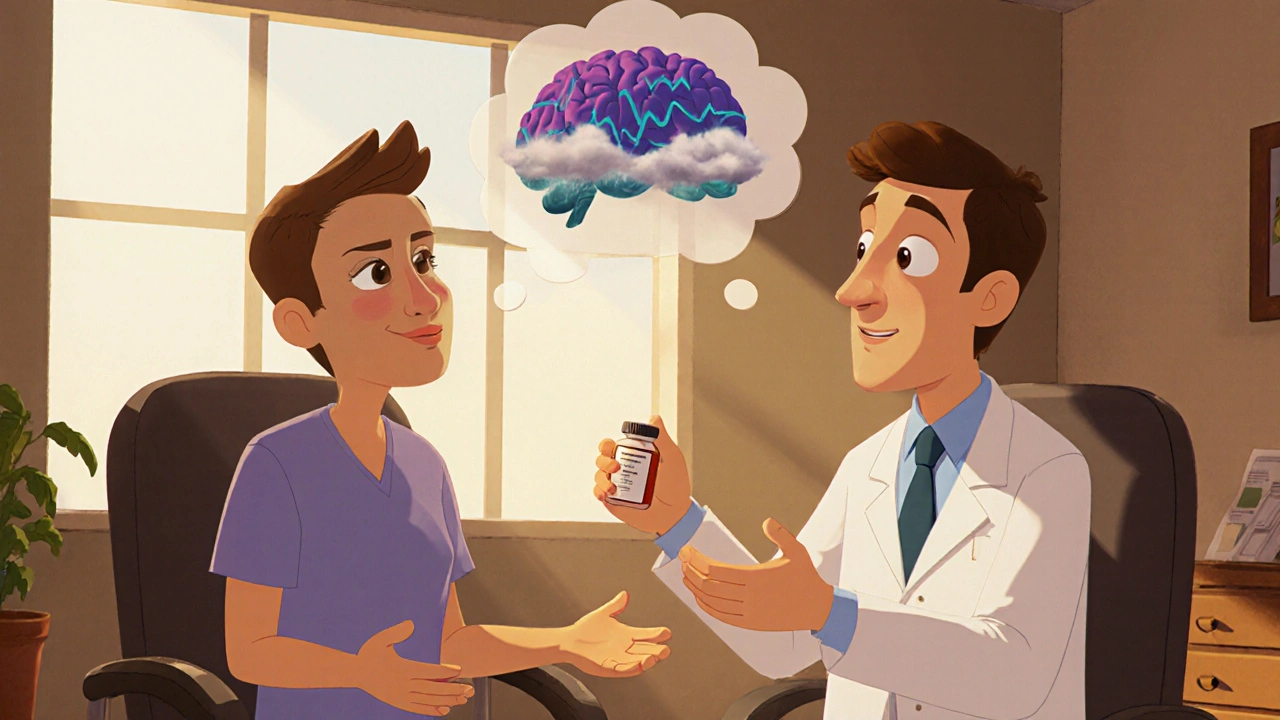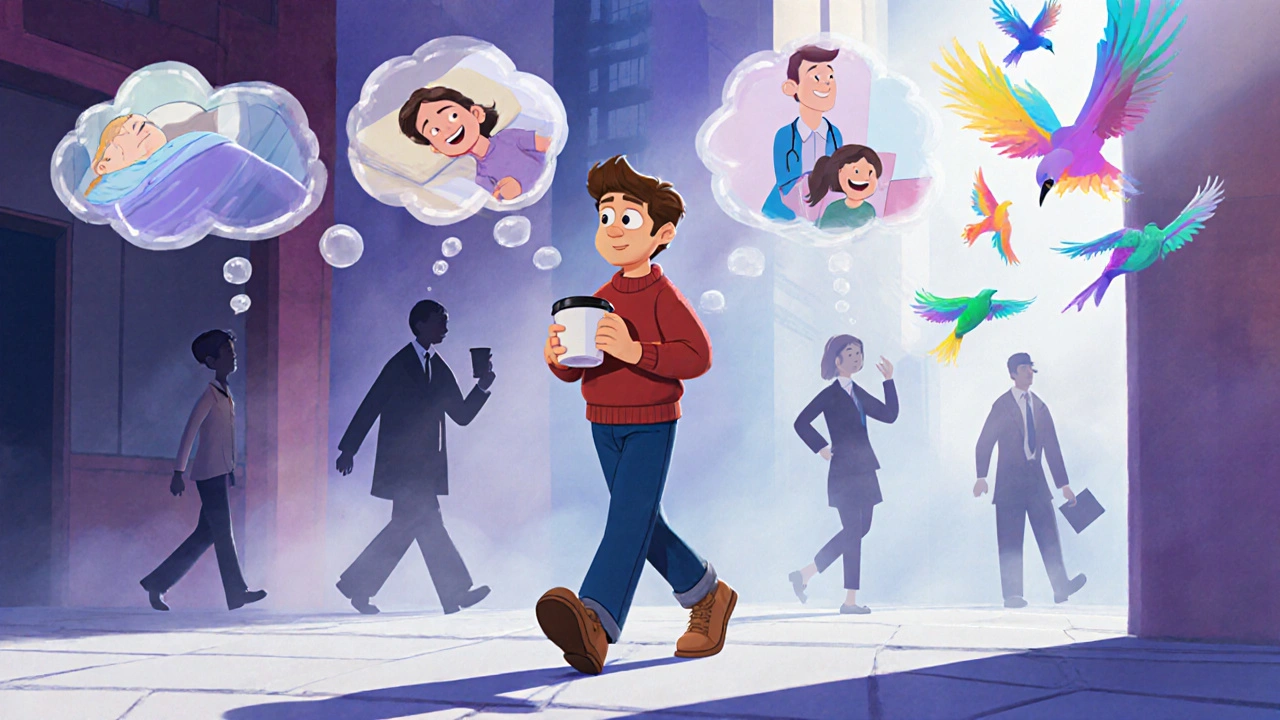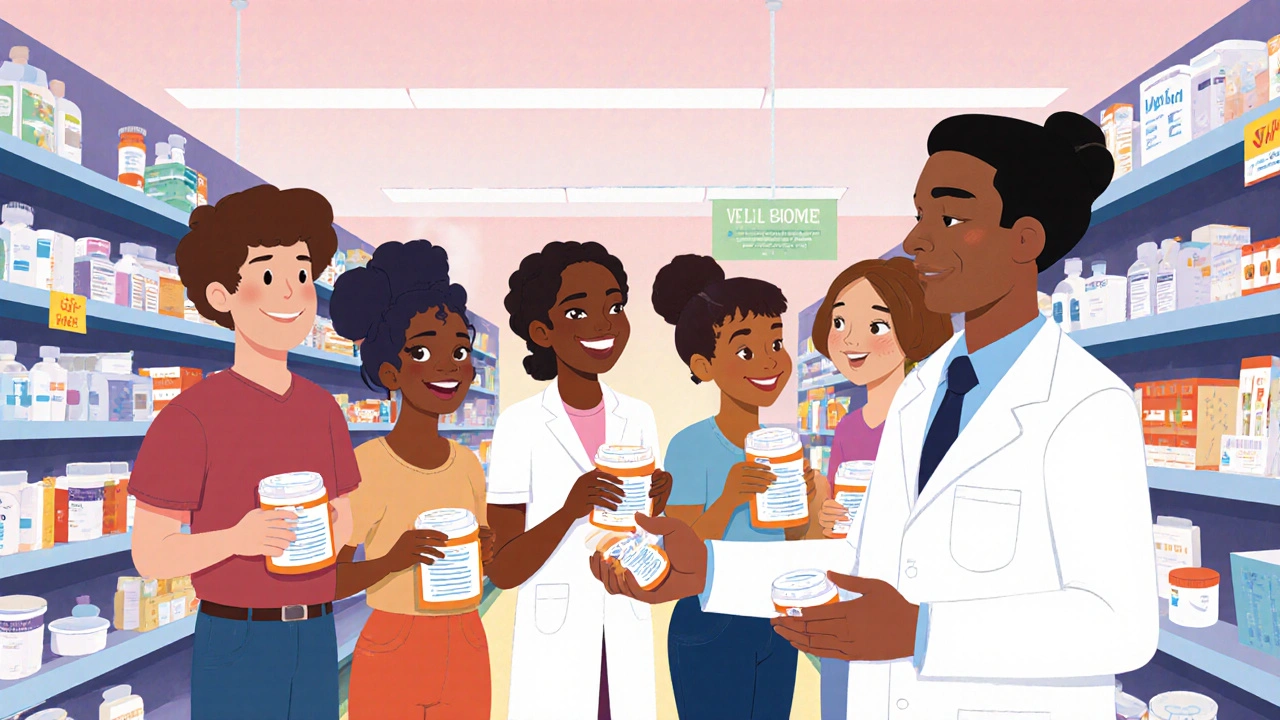When someone says they take medication for depression or anxiety, the reaction isn’t always understanding. Sometimes it’s silence. Sometimes it’s a raised eyebrow. Or worse - a comment like, "You’re just taking pills to feel better?" This isn’t just awkward. It’s harmful. And it keeps people from getting the care they need.
Why Mental Health Medications Are Stigmatized
Mental health medications are treated differently than insulin for diabetes or blood pressure pills. Why? Because of deep-rooted myths. Many people still believe that taking psychiatric medication means you’re weak, unstable, or "not trying hard enough" to get better. Some think these drugs are addictive like street drugs. Others assume they change your personality - that you’ll become a zombie or lose yourself. The truth? Antidepressants and antianxiety medications work. For moderate to severe depression, studies show 40-60% of people see real improvement. That’s similar to how many heart medications work. Yet, 25% of people stop taking antidepressants within 30 days - not because they don’t work, but because they’re ashamed. Language plays a big role. Saying "I’m on meds" or "I take pills" feels casual, even dismissive. But saying "I take medication for my brain chemistry" changes the tone. Research shows using words like "medication" instead of "drugs" reduces stigma by 41%. It’s not just semantics - it’s about framing.How Providers Contribute to - or Reduce - Stigma
Healthcare providers are on the front lines. But many still carry unconscious bias. A 2021 study found 22% of primary care doctors felt uncomfortable when patients asked for psychiatric medication. Some even assume patients are seeking drugs for non-medical reasons. This isn’t about blame. It’s about training. Providers who complete 8+ hours of cultural competency training show a 29% drop in stigma-related attitudes. Simple changes make a difference:- Don’t say, "Do you need a pill?" Say, "Would medication help balance your brain chemistry?"
- Don’t rush the conversation. Ask: "What are your concerns about taking medication?"
- Normalize it. Say: "Many people I work with take medication for mental health - just like others take medication for high blood pressure."
How to Talk About Medication Without Shame
Talking to friends, family, or coworkers about mental health meds is hard. You fear judgment. You worry about being seen as "broken." But you don’t have to explain yourself to everyone. Here’s how to respond when it matters:- Normalize: "I take medication for my brain, just like someone takes insulin for their pancreas. It’s not about weakness - it’s about health."
- Educate: "This isn’t a mood booster. It helps my brain chemicals work right, so I can handle stress, sleep, and focus."
- Personalize: "Before I started this, I couldn’t get out of bed. Now I can work, laugh, and be present. That’s worth it."

What Works: Real Strategies That Reduce Stigma
Some approaches work better than others. Not all awareness campaigns help. In fact, some - like simulation exercises meant to build empathy - can backfire and increase stigma by 15% if they’re not done right. Here’s what actually moves the needle:- Integrating mental health care into primary care: When you pick up your blood pressure script and your antidepressant at the same pharmacy, it feels less separate. Studies show this reduces stigma by 38%.
- Peer support: People who’ve been there - peers with lived experience - are 28% more effective than clinicians at helping others stick with medication.
- Provider storytelling: When doctors or nurses share their own (appropriate) experiences with mental health meds, stigma drops 37% among students and patients. It humanizes the conversation.
- Education with data: When people learn that 70-80% of those with moderate to severe depression need medication *in addition to therapy* to recover, stigma decreases by 34%.
Why Culture Matters
Stigma doesn’t affect everyone the same. In some Asian American communities, 47% lower rates of antidepressant use stem from beliefs that mental health issues should be handled privately - or that medication is shameful or unnatural. In other cultures, medication is seen as a last resort, not a first-line tool. One-size-fits-all advice doesn’t work. A provider in Wellington might use different language than one in Auckland or Christchurch. Respect cultural context. Ask: "How do you feel about medication in your family?" Let the person guide the conversation.
What Not to Say - and What to Say Instead
Avoid these phrases:- "You don’t need that."
- "Have you tried yoga or meditation?"
- "You’re just taking drugs."
- "Everyone feels down sometimes."
- "Taking medication doesn’t mean you’re failing - it means you’re taking care of yourself."
- "It’s okay to need help. Many people do."
- "What would make you feel more comfortable about trying this?"
What’s Changing - and What’s Next
Things are shifting. By 2026, the American Medical Association predicts 65% of antidepressant prescriptions will come from primary care - not psychiatrists. That’s a big deal. When mental health meds are treated like any other prescription, stigma fades. Digital tools are helping too. The SAMHSA "Medication Conversation Starter" app has been downloaded over 150,000 times. It gives people scripted responses to common stigmatizing comments - "I’m not weak for needing this," or "This is my treatment plan, like my heart meds." Telehealth has a downside, though. 41% of patients say they feel less comfortable discussing meds over video calls. Privacy matters. If you’re seeing someone online, make sure the environment feels safe. Use headphones. Close the door. Let them know you’re listening.Final Thought: It’s Not About Perfection
You don’t have to convince everyone. You don’t need to defend your choices to strangers. But when you speak honestly - with clarity and calm - you help others see mental health medication for what it is: medical care. The goal isn’t to make everyone agree. It’s to make it safe for people to say: "I take medication. And it helps."Why do people feel ashamed about taking mental health medication?
People feel ashamed because of long-standing myths - like thinking psychiatric meds are addictive, make you "not yourself," or signal personal failure. Unlike insulin or blood pressure pills, mental health medications are often wrongly linked to recreational drugs or seen as a sign of weakness. Cultural beliefs, media portrayals, and even provider attitudes reinforce this shame. Many worry about being judged at work, by family, or in their community - and that fear keeps them from getting help.
Can talking about my medication make stigma worse?
It can - if the way you talk about it reinforces stereotypes. Saying things like "I’m on drugs" or "I take pills to feel normal" can unintentionally validate stigma. But when you use clear, medical language - like "I take medication to balance my brain chemistry" - and frame it like any other chronic condition treatment, stigma decreases. People respond better to facts and calm confidence than to guilt or apology.
How do I bring up medication with my doctor without feeling judged?
Start by asking open questions: "What are my options for managing my symptoms?" or "How do you usually approach treatment for this?" If you feel rushed or dismissed, say: "I’d like to talk about whether medication could help - I’ve heard it works for many people." A good provider will listen without judgment. If they don’t, it’s okay to find someone else. Your care matters.
Is it true that mental health meds don’t work for most people?
No. Research shows 40-60% of people with moderate to severe depression see meaningful improvement with medication - similar to how many heart medications work. For some, it’s not enough alone, which is why therapy is often combined with it. In fact, 70-80% of people with moderate to severe depression need both medication and therapy to recover fully. It’s not a magic pill, but it’s a proven tool.
Should I tell my employer I’m taking mental health medication?
You don’t have to. In New Zealand, employers can’t legally ask about your medication unless it directly affects job safety. If you need workplace accommodations - like flexible hours due to side effects - you can ask for support without naming the medication. Say: "I’m managing a health condition and need a small adjustment." You control what you share. Only disclose if you feel safe doing so.
Why do some people say medication is "just a crutch"?
That belief comes from misunderstanding how the brain works. Just like a cane helps someone with a broken leg walk, medication helps someone with a chemical imbalance in their brain function better. It’s not a crutch - it’s a bridge. Once brain chemistry stabilizes, people often build coping skills, return to therapy, and eventually reduce or stop meds. Many people use medication temporarily - and that’s okay.


Rachel Wusowicz
November 15, 2025 AT 22:39So... let me get this straight: the government, Big Pharma, and the WHO are all in cahoots to normalize psychiatric meds under the guise of "brain chemistry"-but they’re secretly using it to chemically tame the population? I mean, have you seen how many people on SSRIs suddenly become docile? No more protests. No more dissent. Just... quiet. And don’t even get me started on the FDA’s 2017 "Mental Health Medication Integration Initiative"-that was a cover for mass surveillance via prescription tracking, I swear it. I’ve got spreadsheets. And yes, I’ve emailed the CDC. They didn’t reply. That’s confirmation enough.
Teresa Smith
November 16, 2025 AT 12:52The fundamental issue here isn’t language-it’s epistemology. We’ve allowed a biomedical reductionist framework to dominate mental health discourse, erasing the existential, social, and spiritual dimensions of human suffering. Medication is not a panacea; it’s a tool. But when we equate chemical balance with wellness, we infantilize the human capacity for resilience, meaning-making, and growth. The real stigma isn’t in the public’s misunderstanding-it’s in our collective surrender to pharmacological solutions as the only legitimate path to healing. We must reclaim agency, not just reframe our vocabulary.
ZAK SCHADER
November 17, 2025 AT 20:58lol wtf is this article. "brain chemistry"?? bro its just drugs. why do liberals always gotta make everything sound like science? i dont need some phd to tell me i take pills to feel better. if you want to feel better, go work out, get a job, stop watching tiktok. america is weak. we need to stop coddling people with antidepressants. its 2025, not 1999. get tough. get real. stop taking drugs.
Deepak Mishra
November 19, 2025 AT 11:36OMG I JUST READ THIS AND I’M CRYING 😭😭😭 I’VE BEEN ON ZOLOFT FOR 7 YEARS AND MY MOM SAID I WAS "CHOOSING TO BE SAD" AND THAT GOD WOULD FIX ME IF I PRAYED HARDER 🙏💔 BUT NOW I TELL PEOPLE "I TAKE MEDS FOR MY BRAIN CHEMISTRY" AND THEY JUST SAY "OH THAT’S COOL" 😍 I’M SO HAPPY I’M NOT ALONE!!! 🥹💖 #MentalHealthMatters #MedicationIsNotWeakness
Diane Tomaszewski
November 21, 2025 AT 11:34It’s just medicine. Like insulin. Like blood pressure pills. People get it when it’s the body. Why not the brain? It’s all part of the same system. I don’t need a lecture. I just need to know I’m not broken.
Dan Angles
November 21, 2025 AT 23:01The normalization of psychiatric medication as a legitimate component of chronic disease management represents a critical evolution in public health discourse. It is imperative that healthcare systems institutionalize this framing through standardized protocols, provider education, and structural integration within primary care settings. The data is unequivocal: stigma reduction correlates directly with depathologization and normalization. We must not only advocate for language change-we must redesign systems to reflect it.
David Rooksby
November 21, 2025 AT 23:07Okay so here’s the thing-everyone’s talking about "brain chemistry" like it’s some magic pixie dust, but have you ever actually looked at the side effect profiles? SSRIs can cause emotional blunting, sexual dysfunction, weight gain, and in some cases, suicidal ideation in young adults. And nobody’s talking about that. And don’t get me started on how the DSM keeps changing the criteria every five years to justify more prescriptions. I’ve seen people on five different meds in three years. And now they’re just… numb. So sure, "it helps"-but at what cost? And why is no one asking if maybe the problem isn’t the brain, but the world? The system? The loneliness? The economic despair? We’re medicating the symptoms of a broken society instead of fixing the society. And that’s the real conspiracy.
Melanie Taylor
November 23, 2025 AT 06:25As a Nigerian-American, I’ve seen both sides. In my family, meds = shame. "Why you taking pills? You don’t need that. Pray more!" But here in the States, my therapist said, "This is like your asthma inhaler for your mind." And I cried. I actually cried. I’m telling my cousins now. I’m telling my aunts. We need to stop treating mental health like a secret. It’s not weakness. It’s wisdom. 🌍💙 #CulturalBridge #MedicationIsMedicine
Danish dan iwan Adventure
November 24, 2025 AT 07:33Pharmacological intervention is a proximal solution to a distal problem. You cannot optimize neurochemistry without addressing socioeconomic determinants: housing instability, food insecurity, chronic stressors. Medication is palliative, not curative. The data you cite ignores confounding variables: placebo effect, regression to the mean, publication bias. True healing requires structural change-not chemical substitution.
Ankit Right-hand for this but 2 qty HK 21
November 25, 2025 AT 10:43This is what happens when you let woke doctors run the show. In India, we don’t take pills for sadness. We eat good food, work hard, and pray. Why are Americans so weak? You got Netflix, Uber, free healthcare-and you still need pills? This is why your country is collapsing. Stop blaming culture. Start taking responsibility. No more meds. No more excuses.
Oyejobi Olufemi
November 26, 2025 AT 02:22Let’s be brutally honest: this entire narrative is a distraction. The pharmaceutical industry spends $6 billion a year on direct-to-consumer ads for antidepressants. They don’t care about stigma-they care about profit. The real enemy isn’t the ignorant cousin who says "just pray"-it’s the boardroom that profits from your dependency. And now they’ve co-opted the language of empowerment to sell more pills. You think saying "brain chemistry" makes you free? It makes you a customer. Wake up. The system doesn’t want you healed-it wants you compliant. And you’re happily handing them your prescription.